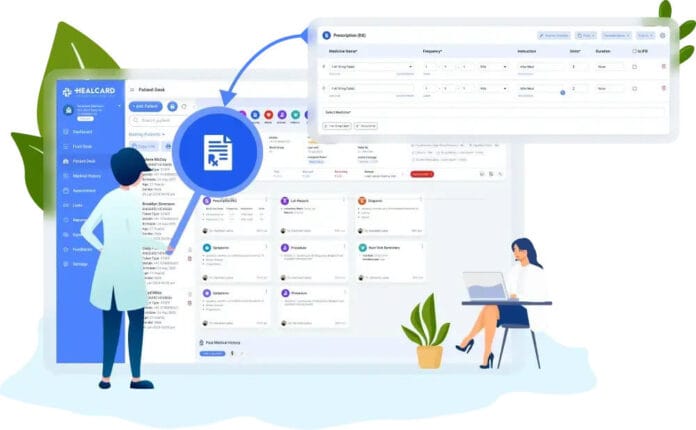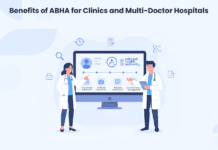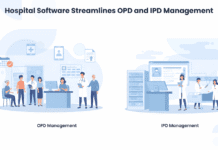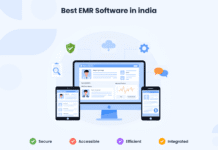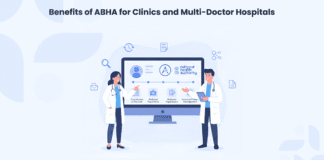Managing a multi-speciality hospital is like handling many small clinics under one roof. Each department, like cardiology, orthopaedics, gynaecology, and ENT, has its own doctors, patients, and records. Doing all this manually can be stressful and confusing.
Paper files can go missing, reports often don’t reach the right department on time, and billing mistakes can cause a lot of chaos. That’s why many hospitals today are choosing Healcard EMR software, a simple, modern healthcare technology solution that makes hospital work much easier.
With Healcard, everything is digital and connected. From patient registration to discharge, you can manage all hospital activities in one easy-to-use hospital management software system.
What Exactly Is EMR Software?
In simple terms, EMR software is the digital version of a patient’s paper record. It stores everything from a patient’s medical history, diagnosis, lab results, prescriptions, and treatment notes, all in one place.
So instead of flipping through paper files, doctors can instantly view a patient’s complete medical background on their computer, tablet, or even phone.
For example, when a patient visits multiple departments (say cardiology and orthopaedics), every doctor can see the same updated information in real time. This means no repetition, no confusion, and no missing details.
EMR software, a leading cloud-based EMR software in India, makes this process smooth and secure by allowing doctors to access data anytime, anywhere.
The Challenge of Managing Multi-Speciality Hospitals
A multi-speciality hospital deals with patients across different departments, each with its own doctors, nurses, and processes. Without a digital system, these challenges are common:
- Disorganized patient data: Each department maintains its own records, making it hard to share information.
- Repeated tests: When one department can’t see another’s reports, the patient ends up repeating lab or scan tests unnecessarily.
- Communication gaps: Doctors and nurses spend extra time coordinating between departments.
- Long waiting times: Manual billing, appointment scheduling, and discharge procedures delay patient flow.
- Errors and confusion: Paperwork increases the chances of mistakes.
All this adds stress to the staff and leads to poor patient experience.
Why EMR Software is Essential for Multi-Speciality Hospitals
Managing a multi-speciality hospital isn’t easy; different departments, doctors, and patients all need to stay connected. That’s where EMR (Electronic Medical Record) software comes in. It works like the hospital’s digital brain, keeping everything organized and in one place.
1. Centralized Patient Data
All departments can access the same patient file. Whether the patient is in cardiology or ENT, their records stay updated and easy to find.
2. Better Coordination Among Doctors
Doctors can instantly check a patient’s past prescriptions, reports, and test results through Healcard EMR, improving care coordination and decision-making.
3. Faster Processes and Shorter Waiting Times
From patient registration to discharge, EMR software speeds up every step. Staff can register new patients in minutes, share reports instantly, and even process billing faster. This means patients spend less time waiting, and hospitals can serve more people efficiently.
4. Completely Paperless Workflow
Say goodbye to endless paperwork and file cabinets. Digital healthcare solutions like Healcard make hospitals go fully paperless.
5. Accurate Billing and Records
Every test, prescription, and service is automatically recorded in the system. This ensures that the billing is accurate, transparent, and free from manual errors. It also helps hospitals maintain clear financial records and comply with audits easily.
Key Features of EMR Software for Multi-Speciality Hospitals
When you choose EMR software for your hospital, here are some must-have features to look for:
- Multi-Department Integration: Connects all specialties, general medicine, orthopaedics, paediatrics, cardiology, etc.
- Doctor-Friendly Interface: Easy dashboard where doctors can access and update patient data quickly.
- E-Prescriptions: Send prescriptions digitally to the in-house pharmacy or patients’ mobile app.
- Lab & Imaging Integration: Lab and radiology results are automatically linked to patient records.
- Appointment Scheduling: Manage OPD and IPD appointments without double-booking.
- Billing & Insurance: Generate bills automatically and handle insurance claims easily.
- Analytics & Reporting: Track hospital performance, patient count, and revenue trends.
- Data Security: Protects sensitive patient data with encryption and secure access.
Healcard includes all these modules and is considered one of the best EMR software for multi-specialty hospitals in India, trusted by doctors and healthcare providers.
Real Benefits of Implementing EMR Software
| Benefit | Description |
| 1. Better Patient Care | Doctors get complete access to a patient’s medical history, reports, and prescriptions in seconds. This helps them make quicker and more accurate treatment decisions. |
| 2. Increased Efficiency | Tasks that earlier took hours, like billing, report generation, and patient record updates, can now be done in just a few minutes. |
| 3. Less Workload on Staff | No more searching for files or entering the same data again and again. EMR automates many tasks, reducing manual effort for nurses and admin staff. |
| 4. Data-Driven Insights | Hospital management can view detailed analytics about performance, revenue, and patient flow. This helps in making smarter business decisions. |
| 5. Happier Patients | With faster registration, shorter waiting times, and accurate reports, patients get a smoother experience, making them more likely to return and recommend your hospital. |
| 6. Paperless & Eco-Friendly | EMR software removes the need for paper records, helping your hospital go digital and eco-friendly while saving storage space. |
| 7. Better Coordination | Doctors, nurses, lab staff, and pharmacists can all access the same real-time data, improving teamwork and avoiding communication errors. |
| 8. Enhanced Data Security | EMR systems like Healcard keep patient data safe with encryption and secure login access no risk of misplaced or stolen files. |
| 9. Easy Access Anytime | Authorized staff can securely access patient data anytime, anywhere, even remotely, improving continuity of care. |
| 10. Regulatory Compliance | EMR software follows HIPAA-compliant standards, ensuring hospitals meet all data privacy regulations. |
Integration with Other Hospital Systems
The best EMR systems don’t work alone; they integrate with other digital hospital solutions like:
- HIS (Hospital Information System) for overall hospital management.
- LIS (Laboratory Information System) for lab reports.
- RIS (Radiology Information System) for scans and imaging.
- Pharmacy System for medication tracking.
- Billing and Accounting Systems for seamless payments.
This integration ensures that every part of the hospital, from lab to pharmacy to billing, communicates with each other in real time.
Such integration makes Healcard a complete hospital management software solution, not just an EMR system.
Example: How EMR Transformed a Hospital
Let’s take a simple example.
A 200-bed multi-speciality hospital was struggling with:
- Slow patient registration
- Long queues at the billing counters
- Lost lab reports
- Miscommunication between departments
After implementing Healcard EMR software:
- Registration time reduced by 60%
- Billing became 90% error-free
- All departments worked in sync
- Patient satisfaction scores went up significantly
This shows how a powerful EMR & EHR system like Healcard can completely transform hospital operations.
FAQ: Multi-Speciality Hospitals
Key features include patient record management, e-prescriptions, lab integration, billing, analytics, and appointment scheduling, all part of a digital healthcare solution.
EMR (Electronic Medical Record) software stores patient records digitally. It replaces paper files and helps doctors see all patient details in one place.
Because many departments work together. EMR software like Healcard connects all of them, making it easy to share patient data and avoid confusion.
Patients get faster service, accurate reports, and less waiting time. Their details stay safe and easy to access during every visit.
It connects all departments through a shared system, making patient data accessible to every doctor. This improves coordination, reduces duplicate tests, and speeds up treatment.
Yes, EMR systems use data encryption and role-based access to keep patient information private and safe.
Yes, most EMR systems are cloud-based, allowing doctors and staff to securely access records anytime, anywhere.
Key features include patient record management, e-prescriptions, lab integration, billing, analytics, and appointment scheduling.
Final Thoughts
In today’s world, managing a multi-speciality hospital without digital support is almost impossible. Paper records and disconnected systems slow everything down and increase the likelihood of errors.
Healcard EMR software changes that completely. It connects every department, automates workflows, secures patient data, and helps doctors spend more time where it matters most with their patients.
If you want your hospital to run smoothly, reduce costs, and deliver top-quality patient care, now is the time to go digital with Healcard, India’s leading EMR and hospital management software.
Ready to upgrade your hospital?
📞 Book Your FREE Demo – Click Here to Get Started
📱 Download the Healcard’s App and manage everything from your phone!
🚀 Experience seamless hospital automation with Healcard – where technology meets care.

